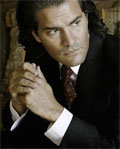Zuill Bailey
A Cellist by Choice
 As an 8th grader, Zuill Bailey encountered a scheduling conflict that forced him to choose between soccer and music. He loved the fastmoving sport, but even so, there was no choice. Bailey had taken up cello at 4, when his parents sat him on a stack of phone books and gave him a chopstick to play with. “I was a child who couldn’t sit still, but they say they’d never seen me so enveloped,” he recalls. “They never had to ask me to play my cello. I would run to it every day.”
As an 8th grader, Zuill Bailey encountered a scheduling conflict that forced him to choose between soccer and music. He loved the fastmoving sport, but even so, there was no choice. Bailey had taken up cello at 4, when his parents sat him on a stack of phone books and gave him a chopstick to play with. “I was a child who couldn’t sit still, but they say they’d never seen me so enveloped,” he recalls. “They never had to ask me to play my cello. I would run to it every day.”
Today Bailey, 36, is a rising star in the world of symphonic music. Represented worldwide by Colbert Artists Management, he is already booked through next May with 45 performances in 21 different states, and as a soloist with 15 different symphony orchestras, including the Anchorage Symphony in Alaska, Santa Barbara Symphony in California, and the Napa Valley Symphony in California.
A professor of cello at the University of Texas at El Paso and artistic director of El Paso Pro-Musica, he has played his 1693 Matteo Goffriller cello at Carnegie Hall, the Kennedy Center, and at a 1997 peace conference in Israel. His first Telarc disc, recorded with the San Francisco Ballet Orchestra, is scheduled for release this January.
As a teenager, Bailey traveled 75 miles each way from his Virginia home to study with longtime Peabody professor Stephen Kates, whom Bailey remembers as “larger than life.” After receiving his bachelor’s degree—and winning the Yale Gordon Prize—in 1994, Bailey went on to Juilliard, where he earned his master’s in 1996.
A musician who has played with renowned violinist Itzhak Perlman and Hungarian cellist Janos Starker, Bailey says one of his most memorable performances was during the HBO television series Oz—a recurring role he landed after teaching actor Ned Beatty how to mime cello playing for an episode of Homicide. In Oz, Bailey played a musician serving a prison sentence. Some cast members were actual inmates. Says Bailey with satisfaction, “I got to play Bach and Paganini to an audience that wouldn’t normally go to concert halls.”